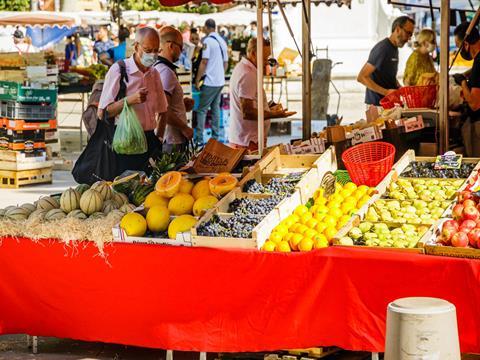
The French Government has announced plans to ban fruit and vegetables from being sold in plastic packaging from January 1st, 2022, as part of its anti-waste law aimed at creating a circular economy with single-use plastic phased out by 2040.
The anti-waste law was voted into effect in early 2020, with the first stage being a ban on the sale of disposable tableware, including glasses, cups, and plates, and cotton swabs in batches. In 2021, the French government expanded this law by banning plastic straws, disposable cutlery, stirrers, lids for takeaway beverage cups, polystyrene boxes, and plastic confetti.
Representing the next step in France’s anti-waste law, plastic packaging for fruit and vegetables weighing less than 1.5 kg will be banned. This will come into effect on January 1st, 2022, but the Government says the law will be applied gradually up until June 30th, 2026, so manufacturers have time to alter packaging solutions. A tolerance period of six months for the disposal of packaging stocks will also be allowed, according to the French Government.
Some of the vegetables included in this law will be leeks, peppers, cucumbers, potatoes, tomatoes, onions, cauliflower, and squash, among others. Meanwhile, apples, pears, bananas, oranges, kiwis, lemons, melons, pineapples, and mangoes are some of the fruits that will be targeted by the addition to the anti-waste law.
For salads, spinach, asparagus, mushrooms, and chicory, the deadline for phasing out plastic packaging will be shorter, with the ban expected to be complete by December 31st, 2024. A shorter deadline of June 30th, 2023, will also apply to tomatoes, peaches, and nectarines.
The new law will have two exemptions: fruit and vegetable sold in lots of 1.5 kg or more, and fruit and vegetables at risk of deterioration if sold in bulk. Raspberries, strawberries, currants and blueberries, alongside ripe fruits picked at maturity, are included in the latter category. Products like lentils and soybeans will also be exempt.
The French Government says it expects a 1 billion reduction in packaging per year as a result of the ban. Currently, it estimates that 37% of fresh fruits and vegetables are packaged in plastic.
In a bid to encourage reuse, France’s anti-waste law urges consumers to bring reusable containers into retail stores to purchase items, as long as the container is clean and suitable for the products purchased.
As part of its Climate and Resilience Law, implemented in August 2021, the French Government is aiming for 20% of medium and large products to be sold in bulk by 2030, reducing or eliminating the need for plastic packaging. This complements the anti-waste law’s targets for 5% of packaging to be reused by 2023, and 10% by 2027.
Further changes to the anti-waste law are expected in 2022, including non-biodegradable plastic tea and herbal tea bags being removed from supermarket shelves in France. The country’s food service industry will also be impacted: the distribution of plastic games with meals will be banned in 2022 and, from 2023, restaurants will be required to replace disposable dishes with reusable ones for meals and drinks served on site.
Press publications and advertisements will also be shipped without plastic packaging from 2022, in accordance with France’s anti-waste law.
Governments in Europe are taking varied measures to address the challenge of plastic waste. Another initiative implemented by France is the HolyGrail 2.0 project, which may see the country have digitally watermarked products introduced to store shelves in the first half of 2022, if the current semi-industrial trial taking place in the City of Copenhagen is successful.
Meanwhile, representatives from the plastics industry recently called on the European Union (EU) to set a recycled content target of 30% for plastics sold on the European market by 2030, although this has been criticised by some for not sharing responsibility across the value chain.













